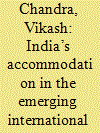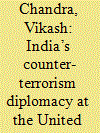|
|
|
Sort Order |
|
|
|
Items / Page
|
|
|
|
|
|
|
| Srl | Item |
| 1 |
ID:
162429


|
|
|
|
|
| Summary/Abstract |
This article has two-fold goals: to develop a coherent concept of accommodation and explicate variable shaping the process of accommodation; and to analyse and evaluate the challenges and prospects of India’s accommodation in the emerging international order. It defines accommodation as a ‘state strategy’ and ‘process’. It figures out six determinants viz. the sphere of influence, structural variables, convergence/divergence of national interest, perception and intention towards the international order, political and socio-cultural values, and costs of non- accommodation. Instead of addressing the process of accommodation from accommodation-seekers’ perspective, the article investigates the issue from accommodators’ perspective. Therefore, rather than describing traditional foundations of India’s claim of accommodation, i.e. population, territory, military, and democracy, it illustrates conditions under which the established power accommodate rising powers. By comparing and contrasting India’s interests, principles, and values vis-à-vis the USA and China, it demonstrates how differing strategic calculations, economic and commercial interests and divergence in political socio-cultural norms and values, China is posing or may pose challenges to India’s accommodation. It suggests that India needs to strike a balance between the declining America and rising China. It will have to learn how not to turn China from an adversary to an enemy. A prudent strategy for India will be to balance China, however, in the non-military, i.e. diplomatic, political and economic realms. Nevertheless, the engagement dimension should not be marginalised, actual or even perceived.
|
|
|
|
|
|
|
|
|
|
|
|
|
|
|
|
| 2 |
ID:
173799


|
|
|
|
|
| Summary/Abstract |
This paper analyses India’s counter-terrorism diplomacy at the United Nations and argues that it is based on five pillars namely, normative, coercive, legal, compliance and domestic implementation, and promotion of international cooperation. The normative pillar elucidates India’s stand on de-legitimisation of terrorism, the root cause approach and sectoral versus comprehensive approach, whereas the coercive pillar divulges India’s position on counter-terrorism sanctions and the use of force. The legal measure explains India’s contribution to the development of international legal framework against terrorism through its sponsoring, co-sponsoring, draft proposal and consensus-building initiatives. Methodologically, it is based largely on the analysis of the primary archival sources, speeches of Indian delegates at the UN General Assembly, its Sixth Committee, and India’s national reports submitted to the UN Counter-Terrorism Committee and 1540 Committee. By analysing India’s counter-terrorism diplomacy at the United Nations, this paper seeks to spark a discourse among researchers working in this field with cases of India and other states as well, and pave the way for further researches on India’s counter-terrorism diplomacy at the United Nations and comparative studies with cases of other states. It concludes with observations that state sovereignty remains at the core of India’s counter-terrorism diplomacy and given the divergence of preferences of states, India’s diplomatic endeavour could not yield desired results.
|
|
|
|
|
|
|
|
|
|
|
|
|
|
|
|
| 3 |
ID:
165269


|
|
|
|
|
| Summary/Abstract |
This article illustrates China’s counter-terrorism strategy at the United Nations (UN), analyses its cornerstones and underscores changing patterns. On this basis, it also seeks to make some broader observations about how rising powers behave in international organisations and to highlight their attitudes towards the liberal international order. It considers Chinese positions in the debates in the General Assembly (1972–2018), its Sixth Committee and the Security Council (since the early 1990s) and identifies four pillars of China’s counter-terrorism strategy. These include norm entrepreneurship, diplomatic measures, promotion of international cooperation and domestic measures to fulfil obligations emanating from UN resolutions, conventions and declarations. It shows how China has shaped the discourse on terrorism at the UN and how its counter-terror narratives and advocacy have been and are being shaped by the discourse among states and competing blocs like the Organization of Islamic Conference over this period. It concludes with the observation that, despite changes in its strategy in recent years, the defining principles of China’s counter-terrorism strategy, such as respect for state sovereignty and non-interference in internal affairs, have not eroded. Changes like accepting that the UN must play a ‘central coordination role’ in international counter-terrorism should be regarded as a further extension of China’s zeal to maintain the international order because the UN is a defining pillar of the present international order.
|
|
|
|
|
|
|
|
|
|
|
|
|
|
|
|
| 4 |
ID:
158577


|
|
|
|
|
| Summary/Abstract |
Established states prefer to accommodate some rising powers while opposing others and the “intentions” of rising powers play an important role in the process of accommodation. Vikash Chandra observes that the prospects for accommodating rising nations with revisionist intentions and wider differences in terms of domestic variables vis-à-vis established powers are poorer than for status quoists and those with large-scale similarities.
|
|
|
|
|
|
|
|
|
|
|
|
|
|
|
|
|
|
|
|
|